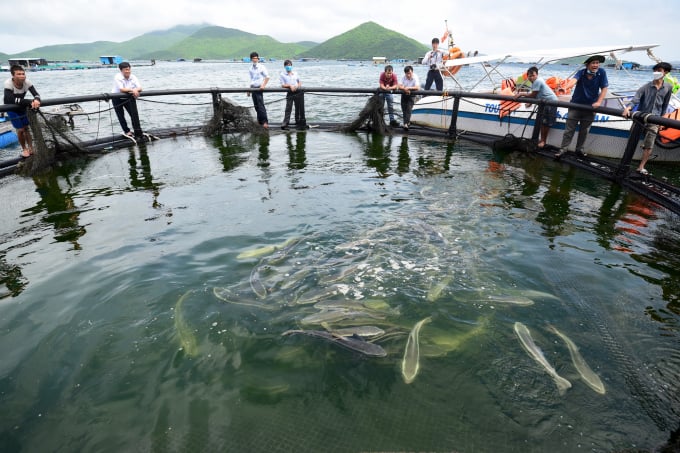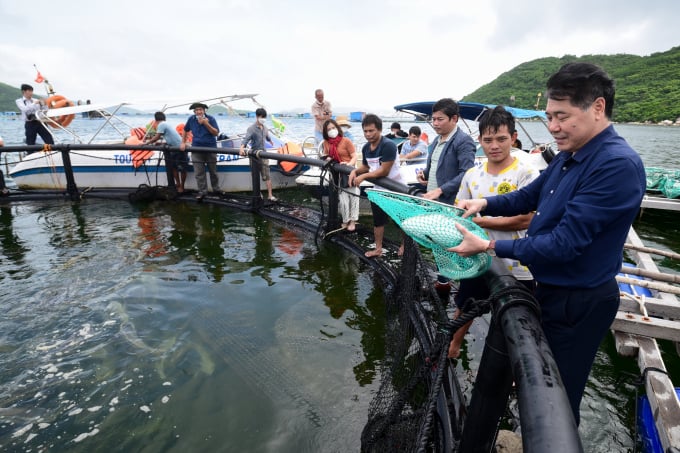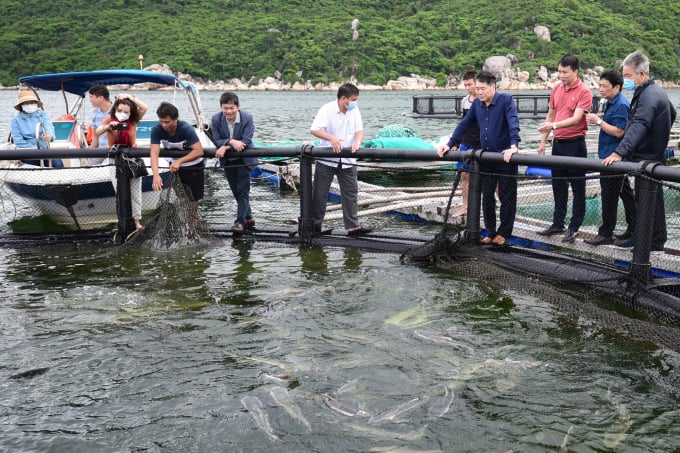June 20, 2025 | 10:11 GMT +7
June 20, 2025 | 10:11 GMT +7
Hotline: 0913.378.918
June 20, 2025 | 10:11 GMT +7
Hotline: 0913.378.918
The Government of Vietnam, in collaboration with the Government of Norway and the United Nations Development Programme (UNDP), has just organized an international conference in Hanoi on "Sustainable Ocean Economy and Climate Change Adaptation: Solutions for a Resilient Blue Economy”.

Blue economy is currently the development trend of Vietnam as well as the world. Photo: Tung Dinh.
In order to accelerate marine space planning and implement the accompanying policies, the Vietnam Administration of Seas and Islands (MONRE) and UNDP have come up with a system of analyzes and recommendations, encapsulated in the report "Blue Economy - Towards sustainable ocean economy development scenario.”
The report presented a “sustainable ocean economy development scenario for Vietnam” up to 2030, meaning a higher level of development of the baseline scenario.
The scenario harnesses outstanding benefits in terms of GDP contribution, GNI of ocean economic sectors and per capita income for marine laborers. This scenario will not only aim for sustainable development but also contribute VND 296 trillion (USD 12.9 billion) to GDP in 2025, and VND 538 trillion (USD 23.5 billion) in 2030 according to the report.
“The report states several important recommendations to promote blue economy in Vietnam, contributing to the successful implementation of ‘the 2030 Strategy for sustainable development of Vietnam's ocean economy - vision to 2045’ and the United Nations' sustainable development goals (SDG) including the SDG14 on the conservation and sustainable use of the oceans, seas and marine resources,” said Mr. Ta Dinh Thi, Vice Chairman of the Science, Technology and Environment Committee of the National Assembly, former Director General of the Vietnam Administration of Seas and Islands.

HDPE cage fish farming area of Research Institute for Aquaculture I on Van Phong Bay, Khanh Hoa. Photo: Tung Dinh.
To be more specific, the recommendations divided according to each industry group include:
- Fisheries and aquaculture: Reduce fishing volume to achieve maximum sustainable levels (approximately 2.7 million tons per year) with a 2% reduction rate annually, reflected in a 5% reduction of coastal ship horsepower per year; conservation of aquaculture area; improvement in management that lead to an increase of safe production rate of 3.5% per year.
- Petroleum: Promote energy saving in oil and gas production activities; strengthen environment protection; increase participation in the field of marine renewable energy production which has recently emerged.
- Marine renewable energy: Soon expand marine renewable energy sources reaching 10,000 MW which will be installed by 2030, including approximately 4,500 MW of nearshore wind (mainly in the Mekong Delta) and 5,500 MW of offshore wind (mainly in the South Central region).
- Tourism: Promote the growth of international visitors by 8-10%/year and domestic tourists by 5-6%/year; reach an occupancy rate of 65% by 2030; incorporate the impacts of climate change, including sea level rise, into tourism planning.
- Maritime transport: Increase sea transport to 20.6% by 2030; increase the volume of goods transported to 787 million tons and domestic transport to 289 million tons.
According to Dr. Nguyen Chu Hoi, Standing Vice President of Vietnam Fisheries Society, the scale of blue economy has expanded in recent years. The most obvious change is the formation of a number of coastal and island economic zones aiming to become a sea economic center, such as the island city in Phu Quoc, showing that the role of the “island economy” has increasingly noticeable.
“However, the scale of the blue economy in Vietnam is still small, with development incommensurate with its potential. Illegal, unreported and unregulated (IUU) fishing remains a pressing issue. Developing the blue economy therefore still requires basic and specific laws and policies concerning the marine environment to effectively implement state management, " said Dr. Nguyen Chu Hoi.
Choosing the "blue economy" is also the must-go development direction as Dr. Nguyen Chu Hoi proposed. He also recommended some policies: take measures to respond to climate change, sea level rise and ocean change manifestations; encourage the development of renewable energy; develop blue economy sustainably based on science; encourage the development of a circular economy for plastic waste, gradually turning plastic waste into a resource; increase the transfer and application of new, low-emission technologies.

The Government has issued many documents to promote the implementation of the 2030 Strategy for sustainable development of Vietnam's ocean economy - vision to 2045. Photo: Tung Dinh.
Translated by Samuel Pham
![Turning wind and rain into action: [9] Digitizing hydrometeorological data in response to climate change](https://t.ex-cdn.com/nongnghiepmoitruong.vn/608w/files/news/2025/06/17/z6704423696987_15fd32ffc26d590d204d520c9dac6786-nongnghiep-165943.jpg)
(VAN) Farmers have begun accessing hydrometeorological applications to adjust their cropping schedules, aiming to ensure productivity and adapt to climate change.
![Turning wind and rain into action: [8] Real-time salinity detection and early warning technology](https://t.ex-cdn.com/nongnghiepmoitruong.vn/608w/files/news/2025/06/17/z6704423696987_15fd32ffc26d590d204d520c9dac6786-nongnghiep-151127.jpg)
(VAN) Thanks to the integration of modern hydrological-hydraulic models, remote sensing technologies, and artificial intelligence, the accuracy of hydrological forecasting has significantly improved.
![Turning wind and rain into action: [7] Early disaster warnings help marine farmers minimize losses](https://t.ex-cdn.com/nongnghiepmoitruong.vn/608w/files/news/2025/06/17/z6704423696987_15fd32ffc26d590d204d520c9dac6786-nongnghiep-142942.jpg)
(VAN) In recent years, thanks to early disaster warnings and forecasting, marine farmers in Khanh Hoa province have been able to reduce risks and losses, thereby improving production efficiency.
![Turning wind and rain into action: [6] ‘Four on-the-spot’ disaster management software](https://t.ex-cdn.com/nongnghiepmoitruong.vn/608w/files/news/2025/06/17/e5a48259d6a262fc3bb3-nongnghiep-183800.jpg)
(VAN) By simply activating the scenario on the disaster management software, the relevant authorities immediately know how many households need to be evacuated, where to evacuate them to, and by what means of transportation…
![Turning wind and rain into action: [5] Hue applies modern technology in disaster forecasting](https://t.ex-cdn.com/nongnghiepmoitruong.vn/608w/files/news/2025/06/17/z6704423696987_15fd32ffc26d590d204d520c9dac6786-nongnghiep-093938.jpg)
(VAN) In Hue city, modern technology has recently been applied in meteorological and hydrological forecasting and warning, helping to reduce the damage caused by natural disasters.

(VAN) A cutting-edge farming technique being implemented on an experimental ranch in Arizona's Sonoran Desert has already saved a billion gallons of water over five years, according to Civil Eats.

(VAN) Poultry and pig production and the environment can be boosted through enhanced water technology, according to new research.